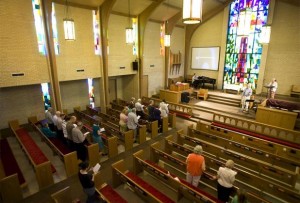“100 Days to Go” was one of the main articles in the Sunday edition of the Cleveland paper, The Plain Dealer. 100 days to go before the November election, which those of us fortunate enough to live in the swing state of Ohio are reminded of about a b’zillion times each time the TV is on.
 We seemed to have moved past overt debates on the
We seemed to have moved past overt debates on the  legitimacy of the religious faith of each candidate, whether it is Gov. Romney’s Mormon faith or President Obama’s Christian faith. Yet the fact that these debates still occur (i.e., whether a Mormon should be president or whether President Obama’s faith is really Christian) signal how imbedded they are in our political considerations well beyond our commitment to religious freedom in the United States. And how befuddled we remain about the “proper” role which religion has (or should have) in public life and common spaces.
legitimacy of the religious faith of each candidate, whether it is Gov. Romney’s Mormon faith or President Obama’s Christian faith. Yet the fact that these debates still occur (i.e., whether a Mormon should be president or whether President Obama’s faith is really Christian) signal how imbedded they are in our political considerations well beyond our commitment to religious freedom in the United States. And how befuddled we remain about the “proper” role which religion has (or should have) in public life and common spaces.
Certainly this is part of the “enduring problem” identified by Richard Niebuhr in his classic book, Christ and Culture. The “enduring problem” is the church’s relationship to state/political order/culture (Niebuhr tends to bundle them together) which are categorized as follows: Christ Against Culture; Christ and Culture in Paradox; Christ Above Culture; Christ in Culture; and Christ Transforming Culture. As I am reading the Old Testament in narrative fashion, I am reminded that the “enduring problem” has continually confronted the people of God. What to do with those who think differently than us? Annihilate them? Assimilate them? Be assimilated by them? Live in different places? Ignore them? Separate from them?
Instead of accepting Niebuhr’s typologies as the only way to frame the issue, perhaps we need to start at a more fundamental level. I surmise that questions about the proper role for Christian faith in politics and how the church should relate to other social institutions is uniquely western, and particularly American. I cannot imagine Christians in China asking this question or Christians in the Middle East. This is why I find the critique offered by José Míquez Bonino a more important starting place than the typologies of Niebuhr. In Toward a Christian Political Ethics, Rev. Míquez Bonino challenges us to think more “Christianly” about politics unless Christian faith become politicized. This involves thinking more theologically and ethically about power, how our society is structured, who benefits and who is harmed by these arrangements, whose stories get told (and hence are seen as most important),and how sin’s affects are more than just personal.
Religion will continue to be politicized and used in all sorts of bizarre and bankrupt ways (the United States is not the only place where this happens). But this is not necessarily the same thing as bringing our faith to bear on matters of concern and interests to all of us. And for the next 100 days? Please come quickly!
















